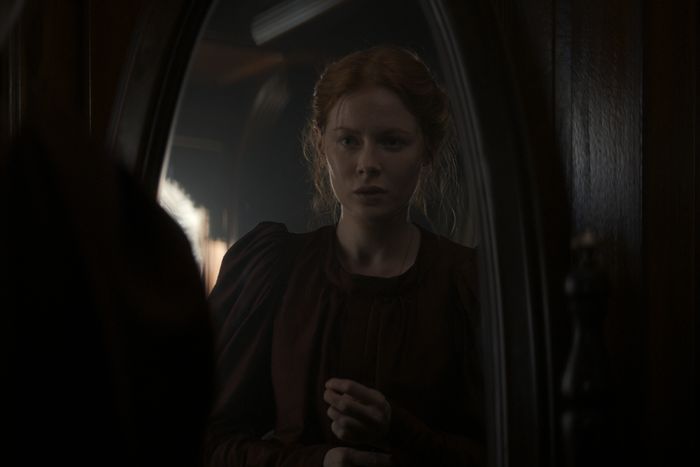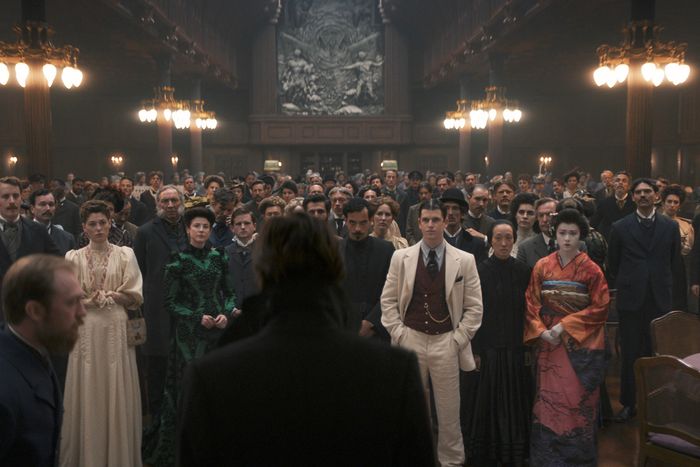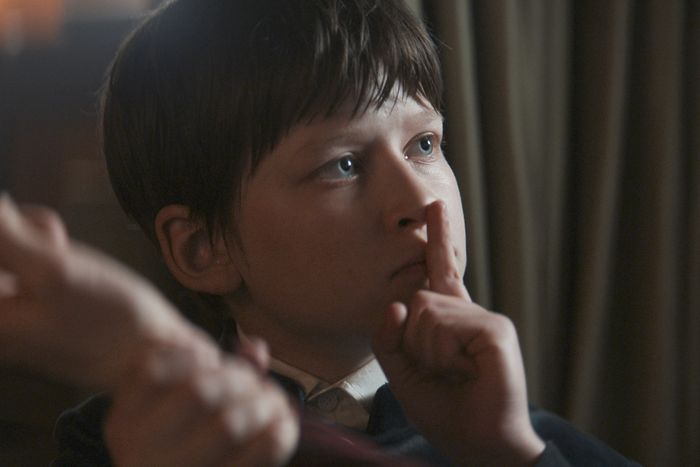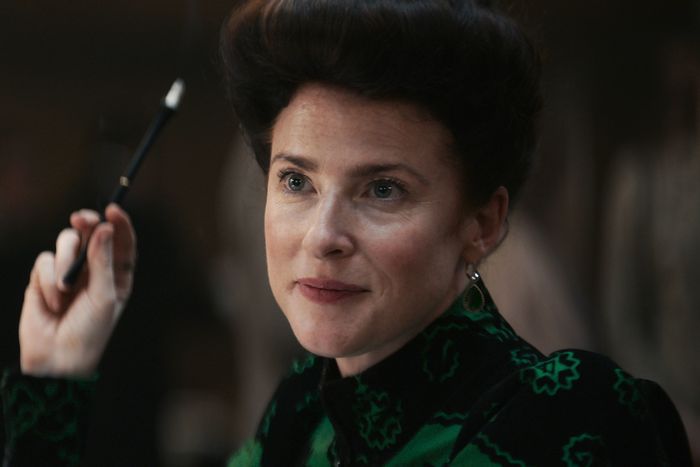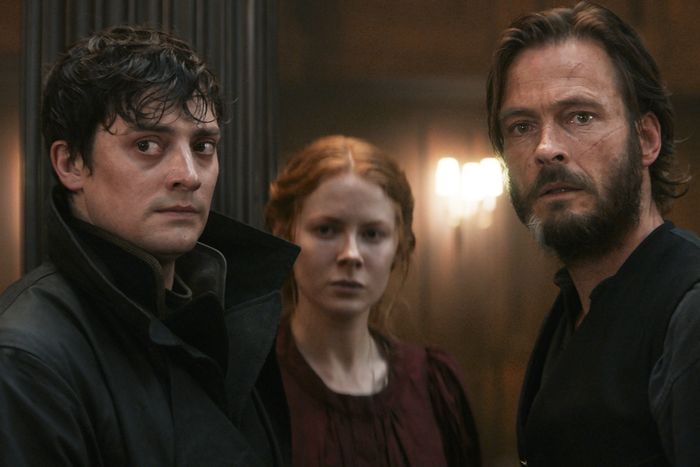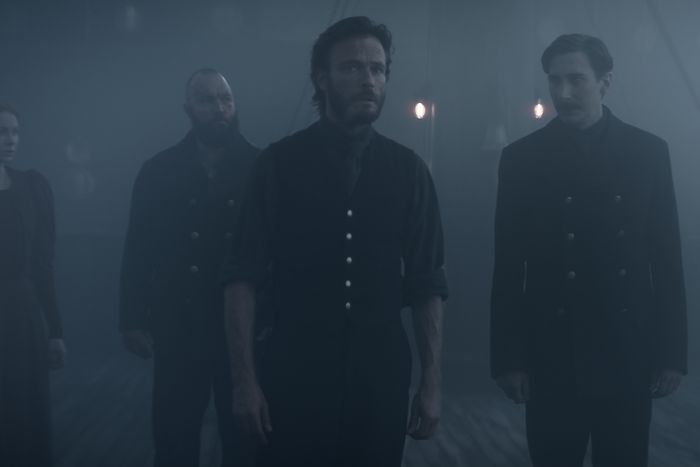
With Dark, co-creators Baran bo Odar and Jantje Friese created a challenging, dense, and ultimately rewarding puzzle-box show about time travel, identity and legacy, and the potential end of the world. With 1899, the pair are back with a puzzle-pyramid show about … time travel, identity and legacy, and the potential end of the world. Bo Odar and Friese like what they like, and the effect of those preferences is, in both Dark and 1899, a highly watchable mindfuck.
1899’s first season follows a group traveling from England to New York City on the coal-powered steamship Kerberos. Four months previously, a ship from the same company named Prometheus disappeared, and that mystery hangs over the Kerberos travelers — each of whom seems to be hiding their own secrets. Maura Franklin (Emily Beecham) is looking for her brother, who she thinks was on Prometheus, and Captain Eyk (Andreas Pietschmann) is still mourning the deaths of his wife and daughters. The deep ensemble includes a madame and a sex worker, veterans and priests, and a stowaway and the ship’s staff, and all their varied motivations and languages demand attentive viewing. And that’s before the series takes a hard turn into sci-fi, travels through a gravity-defying hole in the ocean, and ends up in a place that feels like Inception, Strange Days, The Matrix, Westworld, The Terror, and Eternal Sunshine of the Spotless Mind were thrown into a centrifuge, spun down into their core essence, and then tossed into a blender. It’s a lot!
Can we find the “wake-up” key together? As we await a second-season pickup for 1899, let’s pore over these lingering questions.
1. Are there any reliable narrators here?
Over the course of eight episodes, 1899 transforms from a series about some spooky stuff happening on a ship to a mind-bending discussion of whether the characters’ reality really is reality or a simulation in which they’re trapped. And if they are in a simulation, who built it? Who controls it? Who is the “Creator”? The final two episodes put forth an explanation: Maura built the simulation because Elliot, her son with husband Daniel (Aneurin Barnard), was dying, and she wanted to save Elliot, so she trapped him in this place. Maura’s seemingly villainous father Henry (Anton Lesser) tells Elliot this in a real Hook-inspired turning-a-child-against-their-parents moment, and Daniel confirms that he and Maura worked on the simulation design together.
But can either Henry or Daniel be fully trusted? When Maura wakes up on the spaceship Prometheus, part of Daniel’s provided backstory is proved true by the fact that she receives a mysterious communication from her brother Ciaran, who Daniel said is now in control of the simulation. But it still seems like Daniel isn’t telling the whole story, and Henry — who is trapped in the simulation too — certainly has his own ambitions. Until Maura regains enough of her memory to tell her own story, I doubt we can fully take anyone’s explanation as fact. (Remember, too, that while Maura’s descriptions of Henry as abusive and distant, and her brother Ciaran as resentful that she was her father’s favorite, are seemingly valid, there’s a lot of stuff she also doesn’t remember. She really made this simulation hard on herself!)
2. Who is Maura’s brother?
In the simulation story line, when Maura is traveling on Kerberos, she’s looking for Ciaran and convinced that he sent her that letter marked “What is lost will be found” and the pendant necklace decorated with a triangle. She thinks that Ciaran must have found out something that their father Henry was doing on these ships and that he must have been traveling on the Prometheus and disappeared. But we eventually learn that Ciaran wasn’t on the Prometheus passenger log, while Maura was (because they’re stuck in a loop!), and Daniel provides that late-season info about how Ciaran actually maybe sucks and has taken over the simulation. What is Ciaran’s endgame? Why would he potentially help trap his sister in this place? And who is he? I wonder if we’ve already met him and he’s the first mate played by Tino Mewes. That guy certainly had a familiarity with the simulation structure, was sneering and dismissive of Maura in their limited interactions, and he was sort of a redhead, too, right? Brother, is that you?
3. Does the Alien franchise not exist in this universe?
I’m sorry, a group of people willingly went on a spaceship called Prometheus — are Ridley Scott’s films not part of this reality? Nearly everyone on that ship died, and the travelers putting their trust in android David turned out to be a very bad move! Maybe the 1899 travelers shouldn’t have put their trust in a simulation, either. Or, you know, named their ship after a god sentenced to eternal punishment for helping out humanity?
4. Why did anyone else sign up for this gig?
We learn in the finale, “The Key,” that a number of the passengers on the Kerberos are on the Prometheus spaceship alongside Maura and also strapped into the headpiece things that plug them into the simulation. Back when they were in the simulation and being watched by Henry, he commented on how “every time, they make the same mistakes” — meaning that they’ve all been trapped in the simulation for a long time and that their humanity always shines through. Henry sneers at “silly feelings” like “love, anger, hate,” but we see that those emotions are what give nuance and depth to these characters, nearly all of whom are responsible for some kind of violence, or even murder, in their simulated characters’ pasts.
What I can’t figure out, though, is whether those pasts are at all real. Is the Prometheus spaceship like a criminals-going-to-Australia situation? Are all of these people actually capable of bloodshed? When they’re in the simulation, certain characters are related: Yuk Je (Gabby Wong) and Ling Yi (Isabella Wei) are mother and daughter, and Iben (Maria Erwolter) and Anker (Alexandre Willaume) are parents to Tove (Clara Rosager) and Krester (Lucas Lynggaard Tønnesen). Do those relationships hold in “real life”? As with the unreliable narrators complicating what we can actually take as fact about Maura, I wonder which details of the Kerberos-Prometheus traveler backstories we can accept. Honestly, I’d be fine with all of these connections being made up except for Ling Yi and Olek’s romance; we must protect that!
5. Where are the coal-shovelers?
This is a question that I also had for the film Don’t Worry Darling: Are the secondary characters in 1899 just lines of code with no human counterparts? Because just as important to me as Ling Yi and Olek’s romance is that the pair of coal-shovelers we followed halfway through the season, Landon (Alexander Owen) and Darrel (Ben Ashenden), return for season two. Their banter was great! They helped give the Kerberos a real upstairs-downstairs vibe that I enjoyed! A colleague compared them to Rosencrantz and Guildenstern, and she is correct, and I want them back for season two, garlic garlands and all.
6. Are Elliot and Daniel dead?
First, let me say that “Daniel Solace” is an exceptional name; thank you to bo Odar and Friese for that wonderful gift to me, a ’90s goth susceptible to this kind of melancholy self-seriousness. Second, let me ask: Are Daniel or Elliot alive? When Henry takes Elliot, he tells him that Maura trapped him here and injects him with a syringe that shows him a memory of Maura and Daniel, in futuristic-looking jumpsuits, restraining him in asylum room 1011. That goes against what Daniel had been telling Elliot, which was that Maura was trapped in this world and they needed to work together to save her. Later on, Daniel tells Maura that after she wakes up using her wedding-ring key and the pyramid crafted from Elliot’s Rubik’s Cube and swears that he’ll “always be there” when she breaks out of the simulation. But when Maura comes to the Prometheus spaceship, neither Daniel nor Elliot is there. Does that mean they’re both strapped into the simulation from somewhere else, maybe another place on this ship? Does that mean that Daniel is strapped in but Elliot is physically dead and his consciousness is in the simulation, Transcendence-style? Or does that mean that they’ve both passed away and Maura’s memories of them — in the simulation or elsewhere — are all that’s left? Ciaran’s message to Maura, “Welcome to reality,” could be read as sneering (just like that “May your coffee kick in before reality does”), and perhaps that sneer is because Ciaran is a major jerk who doesn’t care that his brother-in-law and nephew are dead. Anything is possible!
Side question: Are the white and black liquids in the syringes like the white and black hats in Westworld, where they convey some kind of ethical meaning? Is one real memories and one fake memories? And if they help people move through different “levels” of the simulation, couldn’t someone code the syringes to just break someone out instead of needing a key?
7. Why go back to the year 1899?
Henry and Daniel are both clear that Maura and the Kerberos travelers have been trapped in a loop, doing simulations over and over for a long time. There’s a graveyard of steamships in “The Pyramid” when Eyk ends up trapped on the Prometheus, and we return to that wasteland in “The Storm” with Maura and the remaining survivors of the Kerberos. These aren’t the first ships these people have been on — but why this scenario? Why a steamship, and why the 19th century? Why October 19, 1899? I tried to figure out whether there’s any connection between the numbers 10, 19, and 1899 and it made my head hurt. Daniel told Maura that the simulations used to be their home away from home, but I took that to mean the simulation with the pyramid — which was desolate and scenic enough that it felt crafted by a desire for privacy more than anything else. Is the appeal of a steamship just that it felt like the last time people were really exploring the world and traveling to new places in a collective way? Is it more of an echo of a spaceship than, say, a train or an airplane? I suppose so. Why the simulation had to be set 200 years in the past, though, I don’t quite get, unless it has to do with a certain book …
8. What is the importance of Kate Chopin’s The Awakening?
There is one major philosophical theory put forth in 1899: Plato’s allegory of the cave, in which people watching shadows on a wall perceive that to be reality. Their narrowness of perspective is part of a larger discussion of what we accept as truth and about objectivity versus subjectivity, and that idea gets a workout from Henry, Maura, Daniel, and the Kerberos travelers as they cycle through the simulation and try to break free of it. Kate Chopin’s novel The Awakening, meanwhile, is shown numerous times in the series, but it doesn’t get an explanation the way that Plato’s allegory does. So let’s try! The book was published in 1899 and follows a female protagonist who struggles with the social expectations of women and mothers and attempts to pursue independence and sexual pleasure. Many of the female characters in 1899 follow a similar bucking-convention arc: Maura studies medicine although she can’t practice in the U.K., Tove stands up to her constantly proselytizing mother Iben, Ling Yi pursues a relationship with Olek outside of her responsibilities as a sex worker employed by Mrs. Wilson. In a way, they also “woke up” — but The Awakening doesn’t end happily, which feels a bit foreboding for 1899.
9. What’s going on with Maura and Eyk?
All the sexual tension built between Eyk and Maura — so many long glances and arm touches! — in the Kerberos simulation made me consider a wild theory: What if Maura cheated on Daniel in the real world with Eyk and abandoned Daniel and Elliot, and the reason Maura can’t remember her past is because Daniel wiped it as a way to remove her feelings for Eyk? That is probably a little too soap opera meets Eternal Sunshine, but the show is clearly setting up some type of relationship between Maura and Eyk, and Daniel is clearly experiencing some level of jealousy since he sent Eyk back to the Prometheus as a way to get him away from Maura. Or is the fact that Maura and Eyk develop feelings for each other in the simulation a sign that one’s consciousness can be split between who they are outside of it and who they are inside of it? Parallel people, if you will? We saw a similar thing happen in the final season of Dark, so maybe!
10. How does one choose between Eyk and Daniel?
The most important question of all — and one for which I have no answer. Both striking in heavy overcoats with popped collars! Both very brooding and angularly cheek-boned! Both clearly the type of guy who would write you a long love letter in cursive and ask for a lock of your hair in a way that was romantic, not creepy! Choose your Byronic hero because I (and maybe Maura?) cannot.



